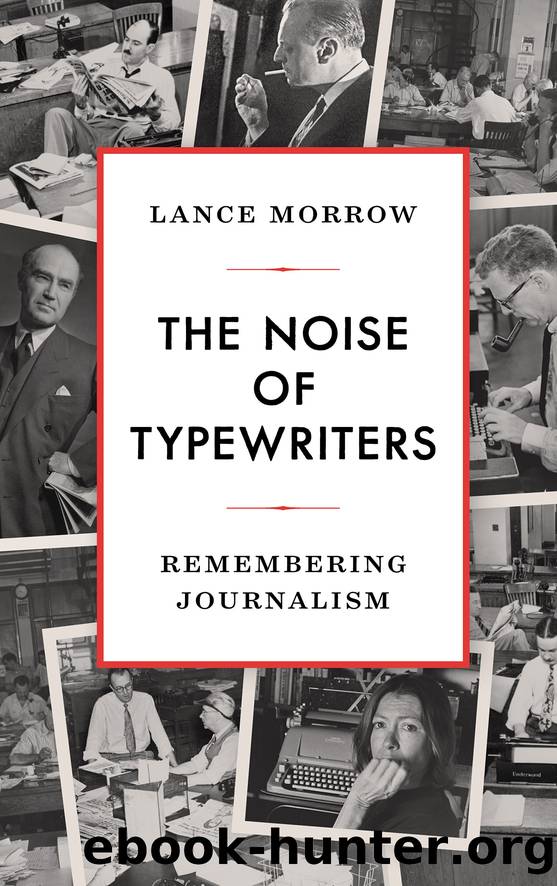The Noise of Typewriters by Lance Morrow

Author:Lance Morrow
Language: eng
Format: epub
Publisher: Encounter Books
CHAPTER 20
The story of the Lucesâ escape from the Boxers had biblical touchesâMoses in the bulrushes, the flight into Egypt.
It was a good story, with an atmosphere of myth and a hint of miracle: A child was plucked from danger in order that he might grow up and do great things in the world.
All of this happened at the dawn of the twentieth century. At that moment, another Henryâthe aging Henry Adams (a Washington journalist in his youth, by the way)âsurveyed the world and feared that the new era, however bright and noisy and smug and overconfident might be its mood at the moment, brought with it unreadable and terrifying complexities.
He was the great-grandson of President John Adams and grandson of President John Quincy Adams, and he professed to be a remnant of a more intelligible and congenial ageâthe eighteenth century. He predicted that the twentieth centuryâs new energies would be satanic and would carry mankind over into a universe of the meaningless, presided over by new forces, which he summarized in his metaphor of the Dynamoâsoundless and terrible.
Darwin had done his work to shake the foundations of religious faith, Freud debunked the innocence of childhood, and Einstein abolished Isaac Newtonâs heavenly clockwork. The old empires collapsed. Electricity turned night into day, the telephone annulled distance; the automobile, the airplane, the moviesâall altered the experience of reality. They changed the nature of natureâturned the worldâs operating systems upside down. Predominantly rural and agricultural America morphed into industrial and urban America. Electric elevators made skyscrapers possible, and cities pivoted ninety degrees, from horizontal to vertical, and the countryâs genes and culture and politics were altered forever as waves of immigrants swarmed in from Eastern Europe and Italy and elsewhere. Americans who had arrived in earlier years, people with old names and embedded identities, began to feel like strangers in their own country.
But Harry Luce had also arrived from elsewhere, from the other side of the world. He, too, in a way was a stranger: an immigrant with all the advantages of the old American stock but with the fresh eye of a kind of greenhornâand also the ambition and the hope and the connections. Luce came as an âimmigrantâ with all possible advantages.
âProgressâ had acquired a dark side. At Ypres and the Somme, long-range artillery collaborated with machine guns that fired several hundred bullets a minute. They achieved an unthinkable productivity of deathâa premonition of what was to come. A generation of Europeâs young men went under. Karl Marxâs new religion, its missionaries more numerous and ruthless than those of the Christians, would overturn empires (in Russia and China) and start an imperium of their own.
The nineteenth centuryâs intellectual solidities broke up and dissolved into incoherence, or into novel, infidel meanings, or anyway a new bewilderment, motifs of disintegration and disillusion reflected in the works of Picasso and James Joyce and Stravinsky and T.S. Eliot and Lytton Strachey and distilled in whatever lessons were to be drawn from terrible actual fragmentationsâcorpses at Ypres and, decades later, ashes of Auschwitz and Hiroshima and Nagasaki.
Download
This site does not store any files on its server. We only index and link to content provided by other sites. Please contact the content providers to delete copyright contents if any and email us, we'll remove relevant links or contents immediately.
Machine Learning at Scale with H2O by Gregory Keys | David Whiting(4313)
Never by Ken Follett(3958)
Harry Potter and the Goblet Of Fire by J.K. Rowling(3860)
Fairy Tale by Stephen King(3400)
Unfinished: A Memoir by Priyanka Chopra Jonas(3391)
The Man Who Died Twice by Richard Osman(3081)
Will by Will Smith(2922)
It Starts With Us (It Ends with Us #2) by Colleen Hoover(2369)
Rationality by Steven Pinker(2367)
Can't Hurt Me: Master Your Mind and Defy the Odds - Clean Edition by David Goggins(2343)
The Dark Hours by Michael Connelly(2311)
The Storyteller by Dave Grohl(2238)
Friends, Lovers, and the Big Terrible Thing by Matthew Perry(2231)
The Dawn of Everything: A New History of Humanity by David Graeber & David Wengrow(2210)
The Becoming by Nora Roberts(2205)
The Stranger in the Lifeboat by Mitch Albom(2125)
Cloud Cuckoo Land by Anthony Doerr(2114)
Love on the Brain by Ali Hazelwood(2079)
Einstein: His Life and Universe by Walter Isaacson(2026)
